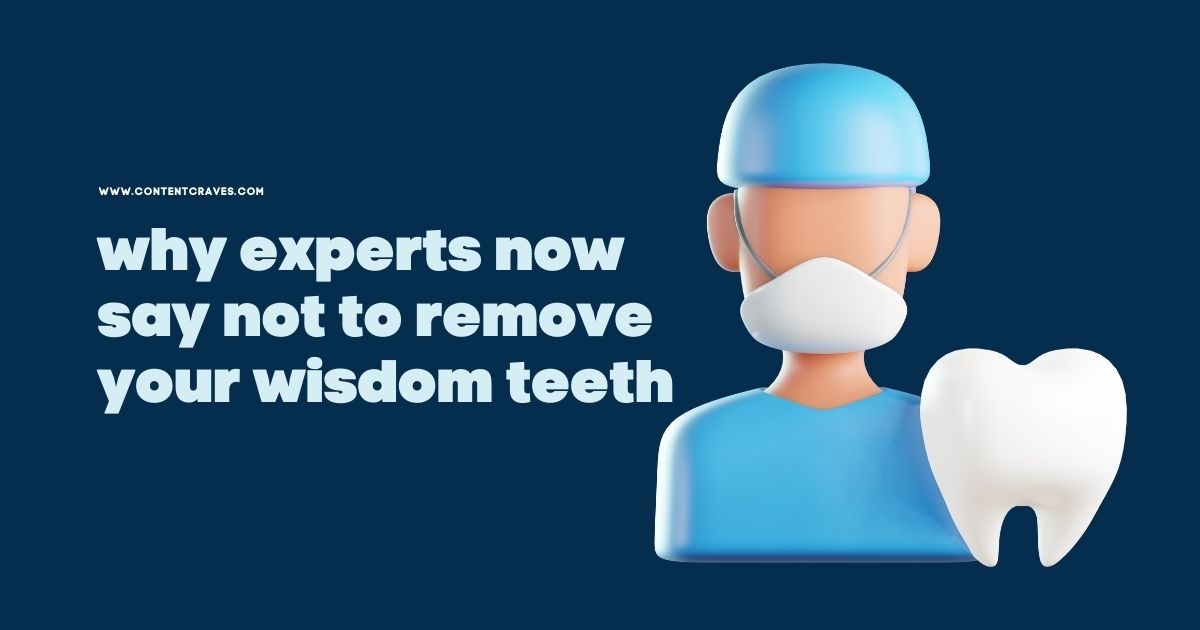Why Experts Now Say Not to Remove Your Wisdom Teeth
Wisdom teeth, also known as third molars, have sparked decades of debate among dentists and healthcare professionals. For years, their removal was often considered routine, even when no immediate problems were apparent. However, a new wave of research and expert opinions has shifted the narrative. So, why experts now say not to remove your wisdom teeth unless absolutely necessary? Let’s explore the rationale behind this change, uncovering the reasons to reconsider this once-common practice.
Understanding Wisdom Teeth and Their Role
Wisdom teeth are the last molars to develop, typically emerging in early adulthood. In ancient times, these teeth were crucial for chewing tough, uncooked foods. Today, with modern diets and dental care, their functional necessity has diminished, but their presence remains.
The Historical Trend of Routine Extraction
For decades, wisdom teeth removal was almost a rite of passage. Dentists frequently recommended extraction to prevent future issues like crowding, infection, or misalignment. However, recent insights challenge the need for such preemptive measures.
Why Experts Now Advocate for a Conservative Approach
Why experts now say not to remove your wisdom teeth stems from a growing recognition of the potential benefits of keeping these teeth intact when they are healthy. This change is supported by a deeper understanding of dental health dynamics and improved diagnostic tools.
When Wisdom Teeth Are Healthy and Useful
Not all wisdom teeth cause trouble. If they emerge correctly, align well with other teeth, and remain free of decay or infection, there’s little reason to remove them. In such cases, they can serve as fully functional teeth.
Risks of Unnecessary Removal
While wisdom tooth extraction is generally safe, it carries certain risks, including:
- Nerve damage
- Infection
- Prolonged recovery time
These potential complications underscore the importance of weighing the necessity of surgery.
The Financial Implications of Extraction
Wisdom teeth removal isn’t just about health—it also has a financial component. The costs of surgery, anesthesia, and post-operative care can add up. Avoiding unnecessary extractions can help save on these expenses.
Advancements in Diagnostic Technology
Today, advanced imaging techniques like 3D dental scans provide detailed insights into the positioning and condition of wisdom teeth. This allows dentists to make more informed decisions about whether removal is required.
Cases Where Removal Is Still Necessary
Despite the shift in perspective, some situations do require extraction, such as:
- Impacted teeth causing pain or infection
- Crowding that damages adjacent teeth
- Development of cysts or tumors
In these scenarios, removal is essential for overall oral health.
Environmental and Ethical Considerations
Did you know that medical procedures, including unnecessary surgeries, contribute to waste generation? Avoiding unwarranted wisdom tooth removal aligns with sustainable healthcare practices.
The Role of Preventive Care
Regular dental check-ups and good oral hygiene can minimize the risk of wisdom teeth-related complications. Dentists can monitor their development and intervene only when problems arise.
Listening to Expert Opinions and Your Body
If you’re experiencing pain, swelling, or difficulty chewing, it’s time to consult a dentist. However, if your wisdom teeth are trouble-free, following the advice of why experts now say not to remove your wisdom teeth can save you from unnecessary discomfort.
Conclusion
The decision to remove wisdom teeth should no longer be automatic. Why experts now say not to remove your wisdom teeth boils down to evidence-based dentistry, focusing on individual circumstances rather than blanket policies. By consulting with your dentist and understanding your unique needs, you can make an informed decision that prioritizes your overall health.
FAQs
1. Can wisdom teeth remain healthy throughout life?
Yes, with proper care, many people retain their wisdom teeth without issues.
2. When is wisdom tooth removal unavoidable?
Removal is necessary for impacted teeth, infections, or damage to adjacent teeth.
3. Is extraction painful?
The procedure is painless due to anesthesia, but mild post-operative discomfort is common.
4. How can I prevent wisdom teeth complications?
Maintain good oral hygiene and schedule regular dental check-ups for monitoring.
5. Should I seek a second opinion before surgery?
Absolutely! A second opinion can clarify whether removal is truly necessary.


Post Comment